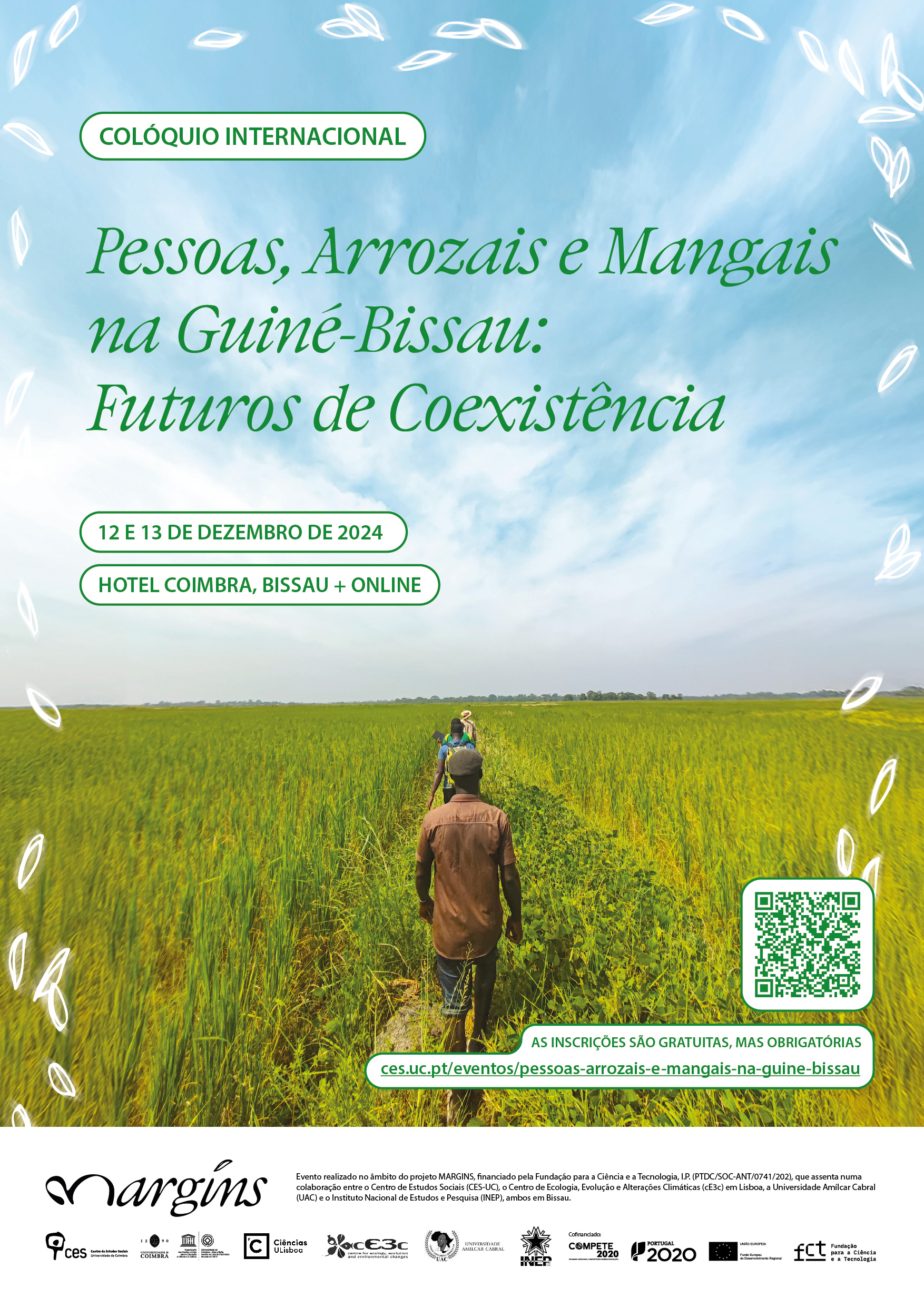International Colloquium
People, Rice Paddies and Mangroves in Guinea-Bissau: Futures of Coexistence
December 12 and 13, 2024
Hotel Coimbra, Bissau (Guiné-Bissau)
The contemporary world is undergoing significant transformations that are leading people and societies, and the ecologies of which they are a part, into uncertain futures. Aspects such as climate and biodiversity, international environmental policy, democracy and social welfare are marked by tensions between continuity and rupture. Several years have passed since the Kyoto Protocol (1997) and the Paris Agreement (2015) and their respective commitments to keep global warming to a maximum of 1.5 ºC, but much remains to be done. On the one hand, over the centuries, carbon emissions have been generated unevenly between countries and ways of life. This inequality has been widely documented but not expressed similarly in climate change mitigation policies. On the other hand, climate change resulting mainly from these emissions affects countries and their ways of life unequally. COP 27 in 2022 recognised the need to compensate certain countries, particularly small island developing states (SIDS), including Guinea-Bissau, for the losses and damage caused by climate change, to which they have contributed little or nothing.
In Guinea-Bissau, the rise in the average sea level is affecting and will affect the livelihoods of peasants who make a living from producing rice in salt pans. Producing food, particularly rice, means producing welfare, which, integrated into the chains of economic exchange, is distributed throughout the territory. Thus, it can be said that Guinea-Bissau is seeing the centre of its production and well-being threatened by climate change. How can the production of well-being be placed at the centre of priorities in the face of the changes the planet is going through?
The mangrove-rice paddie relationship has been able to provide the edaphic means to ensure the production of well-being, while at the same time preserving and producing the internationally recognised biodiversity that has been described for wetlands in Guinea-Bissau. What means and strategies have been implemented to recognise the importance of the relationship between mangroves and rice paddies and ensure its continuity? And to protect and compensate the peasant societies capable of sustaining and producing them, despite ongoing climate change?
The project MARGINS - People, rice and mangroves at the margins: A hybrid and contested interface in a changing world has focused on these and other questions through the study of memory, international relations, anthropology and the ecology of places that are built at the interface between rice paddies and mangroves in Guinea-Bissau. Following a journey of multidisciplinary perspectives, we now delve into its interdisciplinary depth in order to clarify debates, cross-reference experiences and imagine futures.
Based on case studies, it has been possible to document the expansion and contraction of mangroves and rice paddies since 1950, model the variation in mean sea level and its future flooding regimes, study the soil profile from terra firma to mangrove, interpret transformations in rice farming technology and its relationship to labour, knowledge transmission and political transitions, and discuss agrarian and conservation policies. The results presented derive from the analysis of reports and bibliography, remote sensing studies and mean sea level modelling, soil and vegetation analyses, ethnography, memory and participatory mapping.
This lecture will be one of the final moments of public discussion of the work carried out since 2022. Over these two days, we will engage in dialogue in various disciplinary and empirical languages and, from there, cross-reference thoughts, identify common reflections and navigate controversies. The dialogue will take place with recent master's graduates from the project, final-year undergraduates from Amílcar Cabral University, consultants, other team members, collaborators and colleagues from research and institutions dedicated to agricultural and biodiversity management. Finally, it is our aspiration that the reflection and discussion during the lecture, and that the books and podcasts made freely available, can contribute to localised action in the face of the forces that have led and will continue to lead to the forced reconfiguration of coastal areas where the basis of Guinean livelihood - rice - is produced.
Location: Amílcar Cabral University Library, Bissau + online
The MARGINS project (FCT; PTDC/SOC-ANT/0741/202) is based on a collaboration between the Centre for Social Studies (CES-UC), the Centre for Ecology, Evolution and Climate Change (cE3c) in Lisbon, the Amílcar Cabral University (UAC) and the National Institute for Studies and Research (INEP), both in Bissau.


